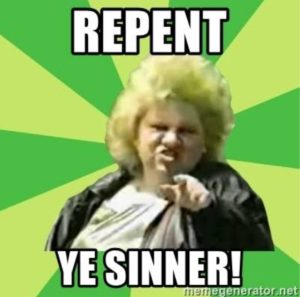The right to tell others how to live v’s The right to be left alone to live life as one chooses
IDENTIFYING THE HOLDERS OF COMPETING RIGHTS
The Folau saga becomes clearer when seen as a battle between:
1. Those, whose religious beliefs compel them, irrespective of legal restrictions, to tell others that they’re sinners and will go to hell unless they are saved, and
2. Those, who seek protection from the law. Because they don’t want to be told that they are going to hell, and how they must live to avoid that.
IDENTIFYING THE COMPETING RIGHTS
When viewed in this light, the competing ‘rights’ are:
1. The right to hold and exercise religious beliefs. In this case, meaning, a right to tell others what to do. When exercised despite its prohibition, the right appears to only respect laws that are in accordance with certain religious beliefs, and
2. The right to be left alone, to live a law abiding life, however one chooses.
PRESENTED AS EROSION OF FOLAU’S RELIGIOUS FREEDOMS
Nevertheless, legal and other attempts to stop the harm caused by unsolicited condemnation, and advice what to do, continue to be presented as denial of religious freedom.

Expression of Belief or Offensive Behaviour?
HISTORICALLY
Over the course of many centuries, western society slowly reduced the ability of those who, in the name of religion, dictated how others lived.
RELIGIOUS PLURALISM
Ours is a multi religious society, As such it relies on mutual respect for other religions and the non religious sector. Publicly denigrating others, as an expression of religious belief, has to be minimised, if not eliminated, if we are to remain a harmonious society.
RESPECTING FOLAU’S BELIEFS
The only respect that appears to have been shown in this saga is the public’s respect of Folau’s right to believe whatever he chooses to believe. No one is telling Folau what he should or should not believe, or how he should lead his life.
THE RESPECT EXPECTED FROM FOLAU
What is being asked of Folau in turn, is that he respect the life choices of vulnerable others, and not publicly condemn and offer unsolicited, unwelcome or distressing advice as to what they need to do.
If he chooses to take up employment that requires him not to discriminate against and condemn other, that is his choice.